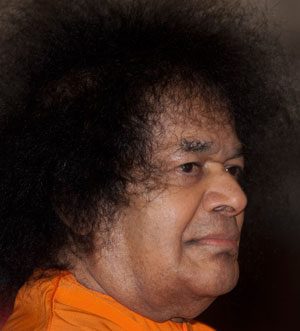azhagi.com/baba - 100s of 'Thought for the Day' nectars of beloved Bhagawan Sri Sathya Sai Baba - translated from English to Tamil by an ardent devotee - typed using Azhagi
Date: Tuesday, 06 Aug 2013 (As it appears in 'Prasanthi Nilayam')

Date: Tuesday, 06 Aug 2013 (As it appears in 'Prasanthi Nilayam')

‘Samskrithi’, the Sanskrit word for culture, is derived from the root word ‘Samskara’ which means the dual process of removing dust and dirt, and planting the virtues of Truth, Right Conduct, Love, Non-violence and Love. Certain obligatory rites of initiation and purification prescribed by the Vedas for one’s spiritual upliftment, are also referred to as Samskaras. There are 48 such, but all of them can be reduced to just one, which is the final and fulfilling one - recognition of one’s identity with the Divine. Man (Nara) is God (Narayana). The individual entity (Jiva) is Divinity (Brahman) seen through the limitations of primal ignorance.(Divine Discourse, Oct 9, 1964.)
''ஸம்ஸ்க்ருதி '' என்ற கலாசாரத்தைக் குறிக்கும் ஸம்ஸ்க்ருத வார்த்தை, '' ஸம்ஸ்காரா'', அதாவது இரட்டைப் பணிகளான தூசு, தும்புகளை நீக்குவது, நற்குணங்களான, ஸத்யம், தர்மம், சாந்தி, ப்ரேமை மற்றும் அஹிம்ஸை ஆகியவற்றைப் பதிப்பது- என்ற ஆதாரச் சொல்லில் இருந்து வந்தது. வேதங்களில் கூறப்பட்டுள்ள, ஒருவரது ஆன்மீக முன்னேற்றத்திற்கான, ஆரம்பம் மற்றும் தூய்மைப் படுத்துவதற்கான சில கட்டாயச் சடங்குகளும் கூட '' ஸம்ஸ்காரங்கள் '' எனப்படுகின்றன. இவை 48 வகையானவை; ஆனால் இவை அனைத்தையும், இறுதியான, முழுமை அளிக்கும் ஒன்றில் - அதாவது ஒருவர் தனது தெய்வீகத் தன்மையை உணர்வது என்பதில், அடக்கி விடலாம். மனிதன் ( நரன் ), மாதவனே ( நாராயணனே ). அடிப்படை அறியாமையின் வரம்புகளின் வழியாகக் காணப்படுகின்ற தனிப்பட்ட ஜீவன், பரப்ரம்மமே.



 24 languages . Tamil, Hindi, Arabic, etc . Never before seen features . Extendable to type in any Language Font Keyboard . Changeable key mappings . Voice input in Android . And more...
24 languages . Tamil, Hindi, Arabic, etc . Never before seen features . Extendable to type in any Language Font Keyboard . Changeable key mappings . Voice input in Android . And more...




















































































































